 About GamePeople
About GamePeople
Subscribe to the Story Gamer column:![]() RSS or
RSS or
![]() Newsletter.
Newsletter.
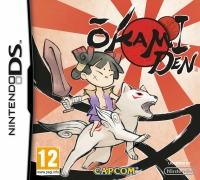
Format:
DS
Genre:
Adventuring
Style:
Singleplayer
Further reading:
Okami
Buy/Support:
Support Mark, click to buy via us...
Other GamePeople columnists have reviewed this from their perspective - huh?:
Family Gamer (DS)
Reporting Gamer (DS)
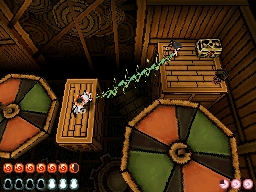
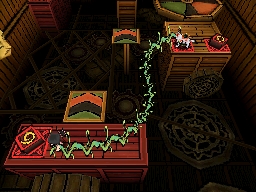
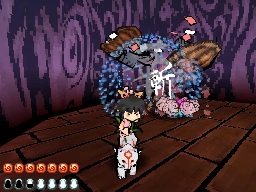
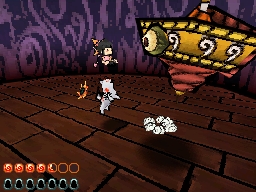
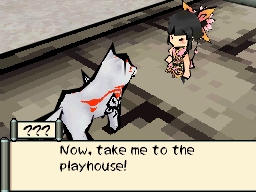
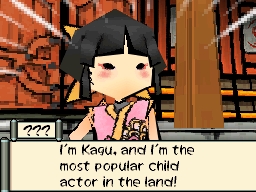
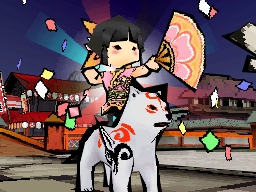
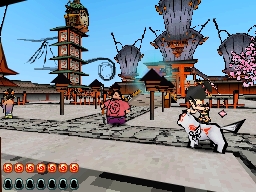

Further reading, films and books that create similar stories:
Okamiden DS is a beautiful intruiging game, but the glittering surface fails to disguise the fact it's nowhere near as inventive as it should be.
Okami was the perfect example of a cult game: critically lauded, clearly distinctive, and commercially unsuccessful. That lack of interest in stores led to much clothes-rending and weeping from Okami fans bemoaning a gaming audience unwilling to take risks on creative, beautiful games over the same old franchises and khaki-toned shooters.
My experience of Okami is probably a typical one: I haven't played it, and I only know it by its reputation as a neglected gem with a gorgeous art style, with a story involving a white wolf wielding a celestial brush to bring colour to a desaturated landscape.
I therefore came to Okamiden, the DS (ed: works on Nintendo DS XL?) sequel to Okami, expecting an innovative game and all that comes with it - a potential challenge, as most unique games are, but one which would be aesthetically and emotionally rewarding in the way that, say, Ico is.
Now, maybe the sequel fell far from the tree, but Okamiden was not the game I expected, but something more conventional.
Let's back up a little. Okamiden is the story of Chibiterasu, a little white wolf hound and the child of Amaterasu, the vulpine sun-god from Okami. At the end of Okami, Amaterasu apparently banished demons from the land of Nippon, but now they're back and Chibiterasu has to learn the skills of the celestial brush to get rid of them again.
Away from the nature trails, Bright Falls is a small town with a long, complex industrial history.
That brush is Okamiden's unique selling point, the key to the game's aesthetics and gameplay. Chibiterasu (Chibi for short) wields the brush as a weapon, magical tool and device for healing the landscape. Tap the DS' shoulder buttons and the view ahead of Chibi freezes, drops to the touchscreen, and switches from colour to monochrome.
Drawing various strokes on the touchscreen causes different effects when time restarts again - straight lines can slash objects and enemies, while a line linking a companion character to a switch will cause them to walk up to and use it. Drawing the hole in a broken object will restore it, while a circle drawn in the sky at key points will cause the sun to shine down.
Ink is in finite supply - although re-ups are plentiful, tucked away in breakable pots which respawn when you re-enter an area - which encourages precision, and using the stylus to make brush strokes feels fluid and tactile. It's a neat gimmick, and one that fits the stylus/touchscreen combo so well it's hard to imagine how it worked with a standard PS2 controller.
There's not much subtlety to be found in Okamiden's story and characters.
Japanese ink-painting isn't just part of the gameplay, it's also the basis of the game's entire graphical style, with characters designed in broad, inky strokes, surrounded by a thick black outline. While this style is lovely, in terms of character designs it's problematic, as there's not much characterisation to be wrung from the simple, near-featureless faces the art style dictates. Instead, emotions are expressed by the broadest of body language, and lack any subtlety.
I suppose the most expressive character in the game is Chibi himself, and there is something believably puppyish about his animations. The nearest I've ever come to owning a dog is having a Shiba Izu on Nintendogs, and I've neglected that for so long that if I turned the game on now there would probably be a sad looking pile of bones in the corner of my Nintenhome, a dusty ball laying neglected in the centre of the floor, un-played with.
If you're the kind of person who had to choke back a tear at the sad story of my sad imaginary dog and his sad imaginary death, then you might make a connection with Chibi the wolf-artist-god-dog with his magic brush. He left me cold, even though he's a strikingly distinctive lead character for a game.
The looks may be distinctive, but beneath the beautifully polished hood there's not much in terms of subtlety to be found in Okamiden's story and characters.
It's another tale of a land overrun with demons, and the young hero who has to kill enough baddies and open enough treasure chests to save the day. The feudal japanese setting is utterly generic, as are the demons which float around the landscape. In an RPG-esque twist the demons within the main map are portals to self-contained battle arenas where you fight demons of different designs, victory kicking you back to the main map.
I found myself constantly losing track of the story.
The characters are also pretty stock types, from the brash young boy who is Chibi's first human companion - and who has to overcome his own fears and uncertainties, of course - to the villages full of 'eccentric' old people who are the same as all eccentric villagers in this kind of story. The blandness of the story and characters isn't helped by a tepid localisation that deals in the most off-the-shelf Americanisms imaginable.
Leaving aside the magic brush, there's a lot of the Zelda series in Okamiden's DNA, with a similar combination of quest based adventuring and puzzles involving an ever-widening inventory of tools and weapons. Fans of classic Nintendo games may also be pleased with the studied blandness of the characterisation and dialogue. I prefer a little more quirk in my characters, and for at least some of the story to be vaguely memorable.
While the core mechanics of exploring, demon-bashing and brush-wielding are perfectly playable, and the whole look of the game is appealing, the story and characters aren't particularly gripping, in fact they're slipperily unmemorable, sliding out of the memory between play sessions.
Lacked the storytelling verve or personality to pull me in.
As the game went on I found myself constantly losing track of the story, what my latest objective was, even where I was. I ended up back-tracking and wandering aimlessly from one rural idyll to another, unable to tell which cutesy character I was supposed to be finding or helping.
In the end, Okamiden charmed me with its artistic flourishes but lacked the storytelling verve or personality to pull me in. It's a beautifully made game, but an ultimately uninvolving experience.



Mark Clapham writes the Story Gamer column.
"I love a good story. Games tell many different stories: the stories told through cut scenes and dialogue, but also the stories that emerge through gameplay, the stories players make for themselves."
Here are the games I've been playing recently:
© GamePeople 2006-13 | Contact | Huh?

|
Family Video Game Age Ratings | Home | About | Radio shows | Columnists | Competitions | Contact
With so many different perspectives it can be hard to know where to start - a little like walking into a crowded pub. Sorry about that. But so far we've not found a way to streamline our review output - there's basically too much of it. So, rather than dilute things for newcomers we have decided to live with the hubbub while helping new readers find the columnists they will enjoy. |
Our columnists each focus on a particular perspective and fall into one of the following types of gamers:
|